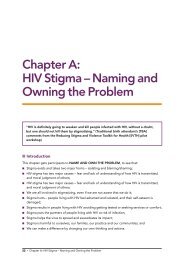Implementing Multiple Gender Strategies to Improve HIV and ... - ICRW
Implementing Multiple Gender Strategies to Improve HIV and ... - ICRW
Implementing Multiple Gender Strategies to Improve HIV and ... - ICRW
Create successful ePaper yourself
Turn your PDF publications into a flip-book with our unique Google optimized e-Paper software.
Timeframe 1987–ongoing; the current strategic plan runs from 2008 <strong>to</strong> 2012<br />
Funders • Danish International Development Agency (DANIDA)<br />
• Irish Aid<br />
• The Republic of Ug<strong>and</strong>a<br />
• Swedish International Development Cooperation Agency (Sida)<br />
• UK Department for International Development (DFID)<br />
• The U.S. President’s Emergency Plan for AIDS Relief (PEPFAR)<br />
through the United States Agency for International Development<br />
(USAID) <strong>and</strong> the United States Centers for Disease Control <strong>and</strong><br />
Prevention (CDC)<br />
Partner<br />
Organizations<br />
Implementation partners:<br />
• AIDS service organizations, including AIDS Information Center (AIC),<br />
Mildmay International Charity <strong>and</strong> UGANDA CARES<br />
• Civil society, including WFP, ACDI/VOCA, Heifer International, World<br />
Vision, FOCCAS Ug<strong>and</strong>a, <strong>and</strong> Ug<strong>and</strong>a Red Cross Society<br />
• Communities affected by <strong>HIV</strong><br />
• Ministry of Health, Ug<strong>and</strong>a<br />
• People living with <strong>HIV</strong><br />
• Ug<strong>and</strong>a AIDS Commission<br />
IMPLEMENTATION AND RESULTS<br />
Start-up <strong>and</strong><br />
Implementation<br />
Process<br />
TASO was founded in 1987 by a group of people directly living with or<br />
affected by <strong>HIV</strong> who were unified by common experiences of stigma,<br />
ignorance <strong>and</strong> discrimination. The founders met informally in each other’s<br />
homes or offices <strong>to</strong> provide mutual psychological <strong>and</strong> social support, <strong>and</strong><br />
voluntarily used their time <strong>and</strong> other resources <strong>to</strong> visit AIDS patients,<br />
carrying them <strong>to</strong> the hospital <strong>and</strong> sometimes providing basic material <strong>and</strong><br />
counseling support.<br />
Currently, 11 TASO centers provide services, within center facilities <strong>and</strong> at<br />
outreach clinics <strong>and</strong> home visits. Four TASO regional centers provide<br />
oversight <strong>to</strong> the TASO service centers within the region <strong>and</strong> build the<br />
capacity of mini-TASOs, which provide services in districts beyond the main<br />
centers. Between the TASO centers <strong>and</strong> the mini-TASOs, the program<br />
works in 74 of Ug<strong>and</strong>a’s 81 districts.<br />
Local Involvement/<br />
Ownership<br />
Communities <strong>and</strong> the government recognize the benefits of the program<br />
<strong>and</strong> therefore are interested in <strong>and</strong> supportive of it. Stakeholders, including<br />
client representatives, participate in the strategic plan design. Clients are<br />
also part of TASO governance, with representatives on the Board of<br />
Trustees, the Regional Advisory Council <strong>and</strong> the Center Advisory Council.<br />
Clients who qualify <strong>to</strong> be counselors are given priority <strong>to</strong> participate in<br />
providing counseling services. Clients also provide feedback on the quality<br />
of services through client exit interviews conducted every quarter.<br />
Evaluation<br />
Methodology<br />
• Program reach: Service providers collect qualitative <strong>and</strong> quantitative<br />
data on program reach. Forms are computerized for entry of<br />
172
















